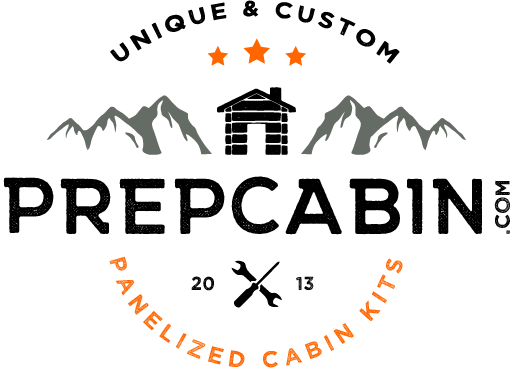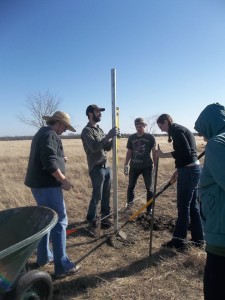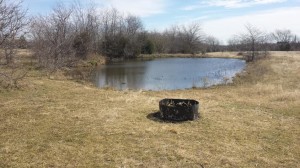This last week I attended a workday at the new DFW Eco-village property about an hour East of Dallas. It is located a few miles south of Interstate-30 in Campbell, TX.
This beautiful grassland property is 70 acres with 2 ponds and a few swales to catch water. It has a slightly rolling feel, going downhill from the front of the property to the back.
The property may be primarily bare at this time – but the plans for the property are impressive – and the woman behind those plans is very motivated.
But first you may be wondering why an eco-village may be important.
What is an eco-village?
From the outside looking in an eco-village may appear to be a group of hippies growing vegetables in the woods, living in huts, and singing Kumbaya all day long.
I assure you it’s much more than that. It’s a great way for humans to live in a sustainable manner that is very low-impact on the environment.
Eco-village living may not be for everyone. But each eco-village has it’s own way of doing things. Some eco-villages offer the same comfort of living that most of us already enjoy. Living in a permaculture and sustainable way doesn’t mean lacking technology or modern conveniences.
But the common shared theme is reducing environmental impact, using the resources available, and self-reliance. People live, work, socialize, and become part of the village supporting themselves and each other.
Living in an eco-village likely isn’t for me but I believe any prepper is a good prepper and I fully support what they’re doing!
To understand the DFW Eco-village I need to tell you about the founder.
Let me introduce you to Terry
I’ve emailed back and forth with Terry for a while and heard of her DFW Eco-village group but I’d never had a chance to meet her until this last week.
Terry spent the last five years working for a green builder to learn the skills she’ll need to tackle this project. One of her main focuses was learning about solar energy and green building methods.
She’s also decided to bring in consultants from Earth Haven – a North Carolina based eco-village – to help her plan out the DFW eco-village.
I got some time to sit down with her during the workday to talk to her about her motivation behind developing an eco-village.
Terry’s main goal behind the eco-village is to provide organic, nutritious, and safe food to sustain it’s population. There is a lot of controversy over the foods we eat. Many believe that processed supermarket foods are likely responsible for 90% of the ailments that modern medicine is trying to cure.
Plus we’re relying on fossil fuels to transport our modified food long distances. This system is inherently unreliable in the instance of a major disaster or fuel shortage.
Genetically modified foods, and all the crap we add to our food in my opinion likely has a direct link to the poor health of our population. And one of the big reasons our foods are so modified is because they are transported such long distances.
For this reason Terry wants to pass on a legacy of responsible food production to her 4 grown children, her grandchildren, other residents of the eco-village, visitors, and the community.
And to accomplish this she already has a strong vision of what the DFW Eco-village will become.
The Plans for The Eco-Village
The DFW Eco-village will be a full-time living community where the members all work together to grow the majority of their food.
There will be no water or electricity from outside providers. They’ll be collection and filtering their own water supply. They’re designing a system of reservoirs and tanks to store water and irrigate their crops. Plus they already have two nice ponds on the property and some water collecting swales.
The same goes for electricity. They’ll be using primarily solar power and they also plan on using wind generators. For times when there is no solar or wind power available they’ll be converting diesel generators to run on used vegetable oil.
For structures and housing they’ll be relying on building with compressed earth blocks. They’ve acquired a small block-making machine but they didn’t have it at the property when I was there. I hope to see it in action soon!
The use of compressed earth blocks supports their belief in sustainability, “if we need to tear down a building we can be planting vegetables on top of it the next day” is how Terry stated her interest in compressed earth buildings.
Upon a little research earth block homes are extremely durable and comfortable to live in. It also helps that they have the right soils available.
Of course the biggest plans are the food production ones. The plan is to convert roughly 30 – 40 percent of the property into what’s known as a “food forest”.
Wikipedia defines a food forest: “Forest gardening is a low-maintenance sustainable plant-based food production and agroforestry system based on woodland ecosystems, incorporating fruit and nut trees, shrubs, herbs, vines and perennial vegetables which have yields directly useful to humans.”
A proper food forest of this size once developed should sustain a fairly significant population.
We talked a lot about gardening and growing food so I asked about their meat supply. Since livestock is damaging to the land and they have to be fed – a lot – they will not have livestock on the eco-village. However they will raise birds like chickens and ducks to help provide for the village. They also have ponds on the property, which may be expanded and used to raise fish.
Since Terry is a vegetarian meat supply isn’t a large concern for her. She isn’t against eating meat but the village will be a “no kill” property. This will require meat eaters to acquire meat from outside the village. I’m guessing the birds are mainly to control insects and provide eggs then.
Another great goal for the eco-village is the future planned addition of an education center for people to come learn about sustainability, energy independence, and food production. It will be their way of giving back to the community while helping people understand their eco-friendlier way of life.
Who will live in the eco-village?
The eco-village will be open for full-time living in a family friendly environment. It may be an off-the-grid lifestyle but it will surely have its advantages for people looking for a more natural way of life.
There was no specific goal for the population of the village but she said there will be fair yet stern rules and an acceptance process. She was also specific to point out that there is strength in numbers and I get the feeling it’s a very accepting community.
I was happy as well to learn that the eco-village will not be considered a “gun-free” environment. Terry still believes in the right to protect yourself and your family. There will be standard firearm safety rules and protocols in place for the community.
Interested in learning more about the community?
The eco-village lifestyle isn’t for everyone. But there is a lot that we can all learn from their approach to sustainability and organic gardening. I’m super excited to see their compressed earth block machine in action and to see the development of their food forest.
You can check out their Facebook page here: https://www.facebook.com/DFWEcovillage?fref=ts
They will also be starting a sustainable living through permaculture class starting March 1st so the deadline is looming. You can see the event and get more information on their Facebook page: https://www.facebook.com/events/736490346363608/
So what are your thoughts on a permaculture lifestyle of sustainability living in an eco-village? Why or why wouldn’t you consider a community like that?
Also do you consider those interested in this lifestyle as preppers? I do so tell me why I’m right or wrong.


